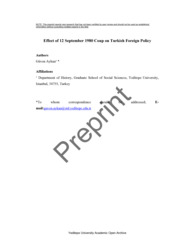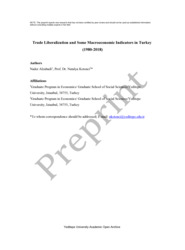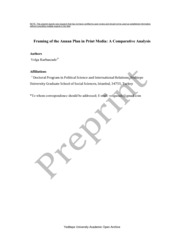Detaylı Arama
- Eklemek veya çıkarmak istediğiniz kriterleriniz için 'Dahil' / 'Hariç' seçeneğini kullanabilirsiniz. Sorgu satırları birbirine 'VE' bağlacı ile bağlıdır.
- İptal tuşuna basarak normal aramaya dönebilirsiniz.
- İptal tuşuna basarak normal aramaya dönebilirsiniz.
Filtreler
Filtreler
Bulunan: 3 Adet 0.001 snKoleksiyon [1]
İlgili Araştırmacılar [1]
Ambargo Durumu [1]
Tam Metin [1]
Eser Adı [3]
Yazar [Asıl] [3]
Yayın Tarihi [1]
Yazar Departmanı [4]
- Yeditepe University Graduate School of Social Sciences 3
- Yeditepe University Graduate School of Social Sciences Department of History 1
- Yeditepe University Graduate School of Social Sciences Doctoral Program in Political Science and International Relations 1
- Yeditepe University Graduate School of Social Sciences Graduate Program in Economics 1
Yazar [KatkıdaBulunan] [1]
Yazar [KatkıdaBulunan] Kurum [2]
Konu Başlıkları [Genel] [20]
- Turkey 3
- Türkiye 2
- 12 Eylül 1980 1
- 12 september 1980 1
- Annan plan 1
- Annan planı 1
- Askeri darbe 1
- Coup 1
- Cyprus 1
- Darbe 1
- Dış politika 1
- Foreign policy 1
- Frames 1
- Greece 1
- Kıbrıs 1
- Macroeconomic indicator 1
- Makroekonomik gösterge 1
- Military coup 1
- Referendum 1
- Ticaretin serbestleştirilmesi 1 Daha fazlası Daha az





